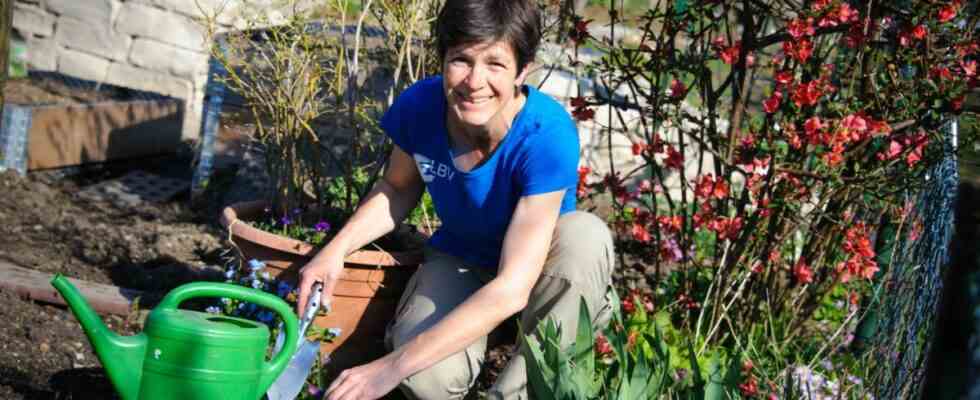Wild bees trundle through the allotment garden in the morning sun, the cherry tree is a blaze of white. At the back of the freshly created pond, dragonflies are buzzing over the water, and young spinach is already sprouting up in the raised bed. Sophia Engel kneels with a trowel under the small willow, yellow buttercups and grape hyacinths grow underneath. “People keep stopping at the garden fence to see what we’re doing here,” says the biologist and deputy head of the State Association for Bird Protection (LBV) in Munich. That is also the intention of the conservationists. “We want to give inspiration to imitate,” says Sophia Engel.
For this reason, LBV Managing Director Heinz Sedlmeier recently leased a plot of land including a hut in the North-West I allotment garden area south of the West Cemetery for the district group in order to create a model garden from it. Within a few weeks you will see that it is worth it. Frogs have already spawned in the freshly created pond, and sometimes even a duck settles on the small body of water. After the official opening at the end of May, visitors can find out here how to manage their garden or balcony sustainably, but there will also be workshops, for example on hibernation options for hedgehogs or nesting boxes.
It is already evident what is possible in a small space, in order to be able to at least partially provide oneself with fruit and vegetables and, on the other hand, to do something for insects, birds, small mammals and reptiles in the city. Not only local herbs grow in the freshly created rock garden, they also offer protection to wild bees and reptiles. A compost heap is of course also part of the inventory of the model garden, from which fresh, nutrient-rich substrate will soon be obtained. “You can really do a lot to protect the environment yourself, even on the balcony,” says Sophia Engel. There, small gardeners could use a worm composter to extract worm castings from kitchen waste. Buying peat should be avoided at all costs.
As is well known, peat is mined in moors, which in Germany have already been almost completely destroyed. But moors are huge reservoirs of carbon dioxide, prevent flooding and provide a habitat for endangered plant and animal species. In Munich there are still relics of moors that are maintained by nature conservationists. The Siberian iris still grows in the Schwarzholzl and Aubinger Moos, as well as peat moss and butterwort. The curlew, on the other hand, which likes to forage in the soft peat soil, has disappeared from Munich since the late 1960s.
Water bowls attract birds and have a small cooling effect
Since most Munich residents don’t have a garden, but at most balconies, the LBV Munich a 35-page brochure published with tips on how environmental and climate protection is possible even in the smallest of spaces. The most important thing: create as colorful a mixture of plants as possible for insects and birds, the plants should be put together in such a way that the balcony blooms for as long as possible, native plants are better than exotic ones, choose wild forms instead of ornamental forms and avoid pesticides and artificial fertilizers. Not only do they harm the animal balcony visitors, but the production is usually very complex. Sophia Engel also advises not simply throwing away faded plants. “We should consider the plants valuable, it’s a shame to throw them away.” In addition, most purchased plants are treated with insecticides that break down only slowly.
In your own garden, Engel recommends creating shady areas as well, which reduces evaporation, especially in hot summers, and cools plants, animals and people. Elderberry or hawthorn, for example, which can be planted in the garden as sun protection, are ideal. If you have enough space, you can also create a wildflower meadow, which is less suitable in a smaller space. And if you don’t want to or can’t build a garden pond right away, you should try a water bowl. It not only attracts wild bees and birds in summer, but also has a small cooling effect.
Of course you can also install your own small, environmentally friendly power plant on the balcony or in the gazebo. Balcony solar devices for the socket can be set up quite legally. However, if they are to be hung on a wall or outside on the balcony, the landlord must agree. That Environmental Institute Munich has created a short guide on how solar power can be easily generated. Of the LBV Munich sends out free brochures on how to bring nature onto your balcony.

